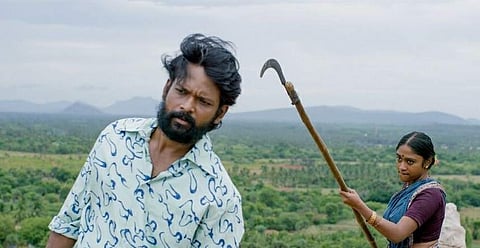Thorati Movie Review: A tightly-knit emotional tale of love and loss
Rating:(3 / 5)
The opening credits of Thorati provide a pleasant surprise. Usually a space reserved for disclaimers like 'No animals were harmed / Characters are not based on anyone', in Thorati , it instead claims that the film is 'not karpanai' and the events it depicts actually happened in Southern Tamil Nadu. It has been some time since we saw a 'based on true events' period film in Tamil cinema, and Thoratti, set in 1980s Ramanathapuram, is staged so wonderfully that we are actually transported to that milieu for the entire runtime.
Cast: Shaman Mithru, Sathyakala
Director: P Marimuthu
Thoratti is a word that refers to the tool (a sickle mounted on a stick) of a goatherd. He/she uses this both to keep the goats in line as well as to ward off predators. The film features Mayan (Shaman Mithru), who uses this in the traditional way for much of the film. But then again, he also uses this in a song sequence where he woos Semponnu (Sathyakala). Semponnu is also a goatherd herself and she uses this same thoratti to pluck puliyampazham from the trees and eat. She loves them so much that she loses all sense of herself whenever she spots these fruits on the ground.
But the word thoratti works at a metaphorical level too. Here are two lovers who are surrounded and influenced by people who are ready to tear them apart. They want to feast on their happiness and their innocence. There are three wastrels Senthatti, Eeppuli and Sothumutti, who live by stealing from others. Like true carnivores, they mark their prey and wait for the right time to move in for the kill. But can such wolves also have a good side? They save Mayan from a tough spot (although they were also saving themselves) and he is so grateful for them that he kills his own goats to feed the trio. This entire stretch is reminiscent of Karnan from Mahabharata when he joins the Kauravas.
In Mahabharata there was a Krishna who pointed out to Karna, "Senjotru kadan theerka seradha idam serndhu vanjathil veezhndhaayada," while here there is a Gopika, in Semponnu, whose name literally translates to Golden Girl. She, much like the heroines of the 80s, is recruited by the family of the groom to 'save' Mayan from falling prey to bad habits and 'reform' him. Irrespective of the existence of such tropes, it is how you treat it that matters. In this film, Semponnu, played by a terrific Sathyakala, brings a whole load of righteous anger to the trope, reminding me a lot of Saritha and how the characters portrayed by her would tackle being a woman in a man's world. This is a girl who isn't shy when it comes to giving a piece of mind to her husband or his wastrel friends. She isn't shy in asking her in-laws to go away to the next village to see an old MGR film so that she and Mayan will have the house to themselves for the night. She isn't shy at taking tough decisions that will leave a lasting impact on her husband's psyche either.
Such lovely characterisations are peppered throughout the script, and it doesn't stop with the characters either. Whilst establishing the world in which this love story takes place, the language used is so rooted that you have to listen hard lest you miss a joke or snarky comment. Also the way the director, who doubles up as writer, has used traditional pagan god worship as a tool to psychologically influence the characters' decisions has to be commended. This painstaking world-building, of a world which is alien to me as a city dweller, and the filmmaker's dedication to stay true to it, really helps this film.
But there are certain aspects that take us out of the world he has created, the biggest culprit being the background score. Thorati has two separate music directors — one for songs and one for BGM — and it is the latter that fails this film. The sounds are generic and the treatment is akin to that of TV serials. In addition, there are innumerable short flashbacks (I lost count after the fifth one) that keep jerking us out of the film.
Like a lot of words in Tamil, Thorati also has a derivative word — Thorathi, which means to get turned/shooed away. These are a bunch of nomads who enter Ramanathapuram district in the 80s for food. They find it, but they also find love. And land. And a life. At a time when the issue of migration into Tamil Nadu from different states and whether it causes depletion in available resources to the native population, is a point of contention, this film's underlying message of the nomadic nature of love underpinning our existence and memories, is a beautiful thought to walk away with.

